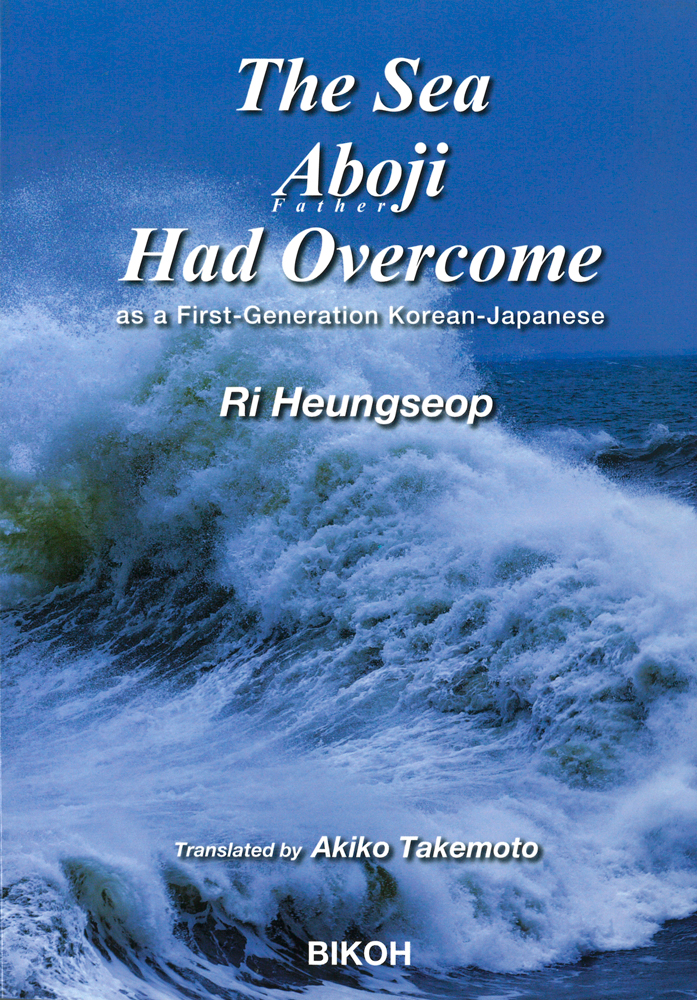ISBN:9784863870895、本体価格:2,000円
日本図書コード分類:C0023(一般/単行本/歴史地理/伝記)
332頁、寸法:150×217×18mm、重量488g
発刊:2018/08

【内容紹介】
What became of Mr. Ri from then on ?
The answer will be found in the part of the speech he gave fortythree years later ― on July 5 in 1988 ― at the law Court in Osaka, while speaking for his compatriot, Mr. Hon Inson, as a fingerprint refuser. The point of his speech went as follows:
Later on, I found there was some official stance to supply us Koreans with a passage to our homeland, but at that time, we had never heard of anything like that. None had told us anything about it, either, and after all, we had to find out our way of keeping ourselves alive. This led me to sell fried sweet potato at a streetstall quarter in and around the harbor in Hakata. Our customers having been those who had just returned from abroad after the warwas over, I soon found it impossible to keep on living in this line.
Then I started selling tobacco. I went as far as Kagoshima Prefecture, the southernmost prefecture in Kyushu in order to buy leaf tobacco, which I manufactured into cigarettes at myaccommodation in Hakata. This lasted for about one year. There was much to gain in this line ― one hundred yen for leaf tobacco turned into 300yen. By and by, however, the occupation forcesfrom the U.S. brought us much tobacco and this led me to move into another business for black-market rice.
Once I was caught for it and was made to pay a fine of 30,000yen ― a huge sum at that time, but since I had already earned muchby selling tobacco, I was able to pay it in cash. As for our having been engaged in such black market as I had been, the reason was because there was not any other way to earn any money at that time. Then about the time of the Korean War(1950-53), therecame into being many construction works on the rivers to make them clean and strong by building banks with blocks and stones. This had kept me busy for about ten years throughout 1950s. Then around 1960, I came to Osaka. It was not easy to find any proper work to do, and this led me to live on for about a year as a picker of unused corrugated cardboard boxes and old newspapers. Then since I became afford to it, I went to a driving school and started this business of collecting metal wastes I have been engaged in since then. This case of mine, I believe, would be the same with all of my compatriots in my generation living in this country.
【目次】
From Aboji to Daughter
I. THE START OF THE LONG JOURNEY
ONE DAY IT CAME OUT OF THE BLUE
In May, 1944
Across the Dark Strait
What Japan was like When I Saw it for the First Time
What I have Remembered about the Land of my Ancestors: Goksan in Hwanghae-do
The First Day in Japan
Being Trained in a Military Fashion
Tunneling our Way through the Gallery
A Scene of Beating up a Traitor
THE DAYS OF OUR COMPULSORY LABOR
The Permission for me to Go out on the Bon Holiday was Suddenly Canceled
My Determination to Take off
I had been Branded as a Traitor
Living in the Double Discrimination against the Koreans
Those who had been out Returned
We had Two More Watchmen at the Mess Hall
The Three of us had Run Away
What Happened at the Mess Hall
Working in the Coal Mine
Who was it that had Brought me the Package of the Burnt Rice Ball?
The Pieces of False Information Given by the Imperial Headquarters
My Thoughts on My Homeland
The Packed Lunch
The Hard Labor in the Coal Mine
The First Salary I had Received
II. AS FAR AS WHERE THE STRAIT WAS SEEN
A Letter from Home
Preparing for Running Away
I had My Salary Raised from November on
Our Plan to Run Away
The Last Meal I had Taken There
I Got the Permission to Go out
The Decisive Action we Took
In the Bus of our Destiny
What I Thought in the Bus
III. EMBRACING THE UNSEEN LAND OF MY ANCESTORS
THE ESCAPEE FROM THE COAL MINE
In the Town of Karatsu
We Found Ourselves at the Guard House
Guided by the Note Handed by the Guard
Our Encounter on the Bridge
The White Rice and the Korean-Style Pickles
We Entered our Accommodation
A New Name Given to Me
I KEEP SURVIVING
At an Unloading Port
To a Small Fishing Village in Fukuoka Prefecture
To Farther West
The Young Men's School in Tatara
My Third Flight
What I Remember about the Pine Juice
I was Employed at Itatsuki Air Port
I Kept on Going Underground
The Falls of Drum Cans
The Train I Took for the First Time
A Piece of Information I Obtained by Paying Three Hundred Yen
What had been Done by the Government General of Korea
The Atomic Bombings upon Hiroshima and Nagasaki
Mr. Nakagawa, the Only Japanese among us
The Broadcast of the Emperor's Announcement of Japan's Surrender
Pondering over Korea, my Ancestral Land
My Birthplace
Japan's Unconditional Surrender
IV. OUR EXPECTATION TO GO HOME
On the Morning of August 16
Mr. Nakagawa's Talk
Thinking about How to Go Home
Mr. Umimoto's Way of Working
Drinking Doburoku
My Farewell Speech
My First Step for Returning Home
The Crowds of People at Hakata Harbor
At the Harbor
The Stable & the Harbor Police that had Remained Unburnt
Our Miscalculation about Our Going Home
Under the Staircase of the Harbor Police
Heading for the Stable
From Daughter to Aboji
【著者紹介】
〔翻訳者〕
武本 明子
〔著者〕
Ri Heungseop